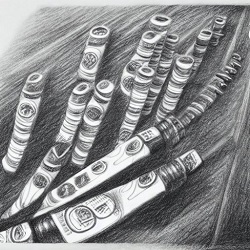
Economic Inequalities
Disparity in wealth, income opportunities and access to services (healthcare, etc.) creating conditions for increased social pressures that lead to oppression. This also relates to trends in mixed migration and is reflective of economic differences between countries of origin and destination.
A (Optimist)
Global initiatives and rapid economic development reduce mixed migration
- Indebted countries have loans forgiven, allowing them to reinvest in society
- Reduced wealth inequalities in third countries: better living standards, abated poverty, wide-spread access to healthcare
- Further economic development makes third countries more attractive, diverting some mixed migration towards those regions
- Global initiative - collaboration between governments - make it compulsory for large corporations to donate a part of their profit to maintenance/financial support for refugee camps around the world → This in turn improves living conditions in refugee camps around the world, reducing the incentive to move onward
B (Pessimist)
Inequalities worsen living conditions and create more migrants and increase the misuse of international protection
- Widening wealth disparities exacerbate poor living conditions for those in need of protection
- Increased motivation to migrate illegally
- Increased social injustice
- Heightened trade barriers and abandonment of free trade (exit of large economic powers)
- Weaker nations bearing burden of weaker international trade
C1 (Mediator)
Increased development triggers greater number of migrants
- Increased economic development leads to increases of migrant outflows
- These outflows are compounded by fore-seen demographic changes
- Global Tax initiatives fund successful eco-nomic development projects
C2 (Mediator)
Wealth inequalities are unevenly addressed, reduced inflows to wealthy nations
- Wealth inequalities are unevenly addressed with rich nations reducing internal wealth gaps
- Poorer nations are unable to draw closer to rich nations, and deal with increasing internal wealth disparities
- Mixed migration becomes less diverse as poorer people are unable to begin migration journey
- Redistribution of resources across rich and poor countries leads to reduced inflows to more wealthy countries
D (Innovator)
Technologies reduce inequalities: AI, telework, renewable energy
- Artificial intelligence (AI) development guides resource and wealth distribution efforts under a new human/political compromise
- Wider acceptance of teleworking enables greater outsourcing, more job opportunities, and reduced economic strains
- Global push for sustainable energy
- Technologies - crypto currency, remote services - make populations less dependent on national economy